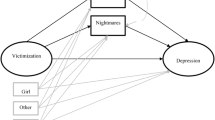Abstract
Examined the relation of dependency to psychological distress among youngsters adapting to summer sleep-away camp. Levels of dependency, self-criticism, and psychological distress were assessed in three groups of campers: children attending a neighborhood day camp, children who were returning to sleep-away camp, and children who were attending sleep-away camp for the first time. Psychological distress was assessed in terms of depression and low self-esteem. The results supported the prediction that dependency would be more predictive of distress for children at sleep-away camp (particularly for names) than at day camp. The specificity of dependency as a vulnerability factor during attachment-related transitions was supported by showing that children's level of self-criticism was not differentially related to distress for the three groups of campers. Results are discussed within the framework of the Personality-Event Congruence Model of Depressive Vulnerability.
Similar content being viewed by others
REFERENCES
Blatt, S. J., D'Afflitti, J. P., and Quinlan, D. M. (1976). Experiences of depression in normal young adults. J. Abnorm. Psychol. 85: 383–389.
Blatt, S. J., Schaffer, C. E., Bers, S. A., and Quinlan, D. M. (1992). Psychometric properties of the depressive experiences questionnaire for adolescents. J. Personal. Assess. 59: 82–98.
Blatt, S. J., and Zuroff, D. C. (1992). Interpersonal relatedness and self-definition: Two prototypes for depression. Clin. Psychol. Rev. 12: 527–562.
Brewin, C. R., Furnham, A., and Howes, M. (1989). Demographic and psychological determinants of homesickness and confiding among students. Br. J. Psychol. 80: 467–477.
Cohen, J., and Cohen, P. (1983). Applied Multiple Regression: Correlation Analysis for the Behavioral Sciences (2nd ed.). Wiley, New York.
Eurelings-Bontekoe, E. H. M., Vingerhoets, A., and Fontijn, T. (1994). Personality and behavioral antecedents of homesickness. Personal. Ind. Diff. 16: 229–235.
Faulstich, M. E., Carey, M. P., Ruggiero, L., Enyart, P., and Gresham, F. (1986). Assessment of depression in childhood and adolescence: An evaluation of the Center for Epidemiological Studies Depression Scale for Children (CES-DC). Am. J. Psychiat. 143: 1024–1027.
Fichman, L., Koestner, R., and Zuroff, D. C. (1994). Depressive styles in adolescence: Assessment, relation to social functioning, and developmental trends. J. Youth Adolesc. 23: 315–330.
Fichman, L., Koestner, R., and Zuroff, D. C. (1996). Dependency, self-criticism and perceptions of inferiority at summer camp: I'm even worse than you think. J. Youth Adolesc. 25: 113–126.
Fisher, S. (1989). Homesickness, Cognition, and Health. Lawrence Erlbaum Associates, East Sussex, England.
Fisher, S., Frazer, N., and Murray, K. (1984). The transition from home to boarding school: A diary-style analysis of the problems and worries of boarding school pupils. J. Environ. Psychol. 4: 211–221.
Fisher, S., and Hood, B. (1987). The stress of the transition to university: A longitudinal study of psychological disturbance, absent-mindedness and vulnerability to homesickness. Br. J. Psychol. 78: 425–441.
Fisher, S., and Hood, B. (1988). Vulnerability factors in the transition to university: Self-reported mobility history and sex differences as factors in psychological disturbance. Br. J. Psychol. 79: 309–320.
Hammen, C., Marks, T., Mayol, A., and deMayo, R. (1985), Depressive self-schemas, life stress, and vulnerability to depression. J. Abnorm. Psychol. 94: 308–319.
Harter, S. (1982). The Perceived Competence Scale for Children. Child Develop. 53: 87–97.
Harter, S. (1989). Causes, correlates, and the functional role of global self-worth: A life-span perspective. In Kolligian, J., and Sternberg, R. (eds.), Perceptions of Competence and Incompetence Across the Life-Span. Yale University Press, New Haven, CT.
Koestner, R., Zuroff, D. C., and Powers, T. A. (1991). Family origins of adolescent self-criticism and its continuity into adulthood. J. Abnorm. Psychol. 100: 191–197.
McKenzie, T. L. (1986). A behaviorally-oriented residential camping program for obese children and adolescents. Educat. Treat. Child. 9: 67–78.
Nietzel, N. T., and Harris, M. J. (1990). Relationship of dependency and achievement/autonomy to depression. Clin. Psychol. Rev. 10: 279–297.
Robins, C. J., and Block, P. (1988). Personal vulnerability, life events, and depression: A test of a specific interactional model. J. Personal. Social Psychol. 54: 847–852.
Robins, C. J., Hayes, A. M., Kramer, R. J., and Villena, M. (1995). Interpersonal and achievement concerns and the depressive vulnerability and symptom specificity hypothesis: A prospective study. Cog. Ther. Res. 19: 1–19.
Rosenthal, R. (1984). Meta-Analytic Procedures for Social Research. Sage, Beverly Hills, CA.
Segal, Z. V., Shaw, B. F., Vella, D. D., and Katz, R. (1992). Cognitive and life stress predictors of relapse in remitted unipolar depressed patients: A test of the congruency hypothesis. J. Abnorm. Psychol. 101: 26–36.
Smith, K. E., Gotlieb, S., Gurwitch, R. H., and Blotcky, A. D. (1987). Impact of a summer camp experience on daily activity and family interactions among children with cancer. J. Pediat. Psychol. 12: 533–542.
Sullivan, K., and Sullivan, A. (1980). Adolescent-parent separation. Develop. Psychol. 16: 93–99.
Weissman, M., Orvaschell, H., and Padian, N. (1980). Children's symptom and social functioning: Self-report scales. J. Nerv. Mental Disord. 168: 736–740.
Zuroff, D. C., and Mongrain, M. (1987). Dependency and self-criticism: Vulnerability factors for depressive affective states. J. Abnorm. Psychol. 96: 14–22.
Author information
Authors and Affiliations
Rights and permissions
About this article
Cite this article
Fichman, L., Koestner, R. & Zuroff, D.C. Dependency and Distress at Summer Camp. Journal of Youth and Adolescence 26, 217–232 (1997). https://doi.org/10.1023/A:1024556732581
Issue Date:
DOI: https://doi.org/10.1023/A:1024556732581




